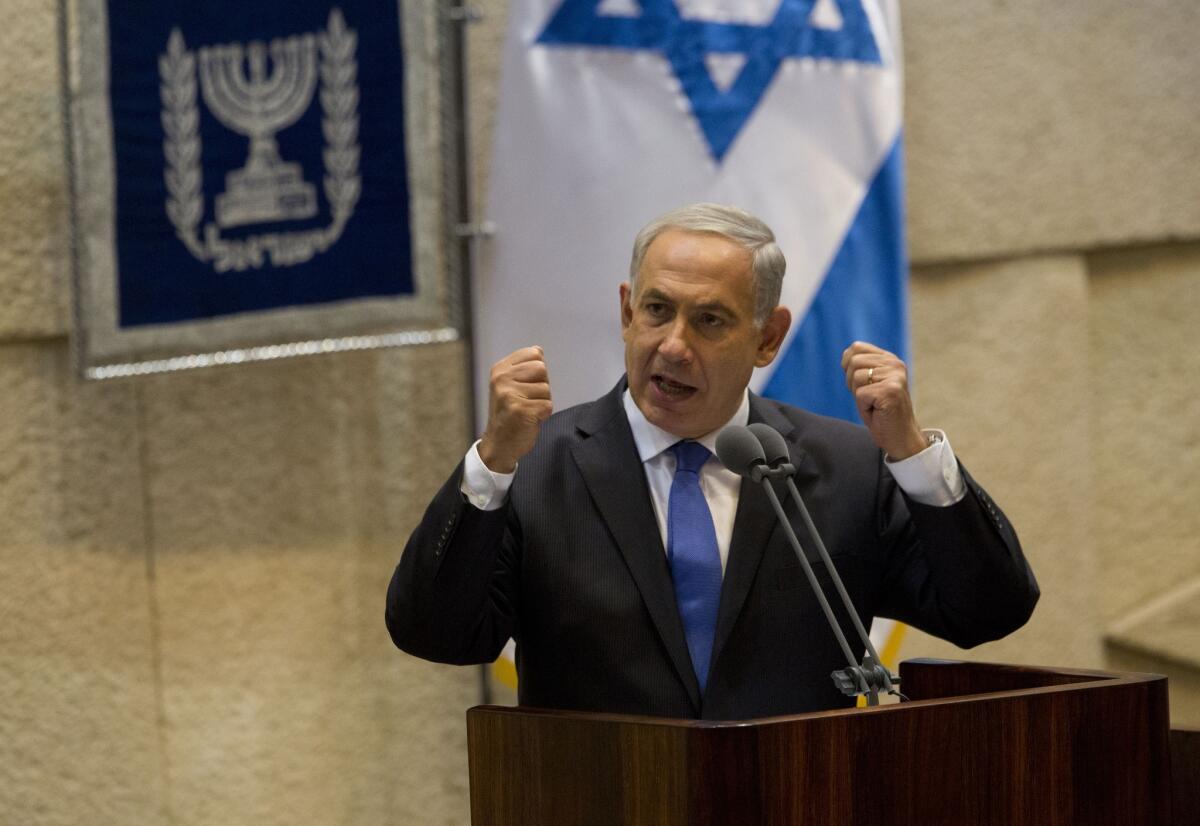Israel: Easing pressure on Iran would be ‘historic mistake’

- Share via
JERUSALEM — With talks between Iran and six world powers set to resume in Geneva on Tuesday, Israeli leaders issued a stern warning to the so-called P5 Plus One diplomatic group: don’t ease pressure on Iran.
It would be a “historic mistake” to relax pressure on Iran “a moment before sanctions achieve their goal,” Prime Minister Benjamin Netanyahu told Israel’s parliament Monday.
In a statement issued ahead of the talks Tuesday morning, Israel’s security cabinet stressed that the opportunity for reaching a genuine diplomatic solution to dismantle Iran’s military nuclear program could bear fruit only if the international community “does not relent” and continues pressure on Iran.
“We want the Geneva talks to succeed. We are not closing the door on diplomacy,” Minister of Strategic and Intelligence Affairs Yuval Steinitz said Monday. Israel will endorse a “satisfactory agreement,” he said.
Steinitz defined “satisfactory” as different from agreements previously reached with, and breached by, North Korea, which now has several nuclear weapons. He said North Korea is a cautionary example of the “impact and ramifications of bad agreements.”
The minister pointed to an agreement with Libya, which gave up its enrichment program and effectively shut down its nuclear program a decade ago, as a good example.
If Iran wants civilian nuclear energy as it claims, it must stop enriching uranium and give up material enriched so far, Steinitz said.
The ministers said Iran could create a “win-win situation” if it gives up enrichment and obtains nuclear fuel from a third country.
Netanyahu contended that despite Iran’s declared commitment to pursuing only civilian nuclear energy, it has been working for two decades to obtain nuclear weapons capabilities, systematically defying United Nations resolutions. While negotiating with the West, Iran has amassed several tons of enriched uranium in recent years, Netanyahu said.
Israel will embrace a “genuine diplomatic solution which would bring about the dismantling of Iran’s nuclear weapons program,” said Netanyahu. This will be possible, the prime minister said, if Iran complies with previous U.N. Security Council resolutions and other steps, including stopping all nuclear enrichment, removing stockpiled enriched uranium, dismantling facilities near Qom and Natanz and halting the plutonium track.
The West appears to have already made a concession to Iran, “a de-facto recognition of Iran’s right to enrich uranium,” said analyst Giora Eiland, Israel’s former national security advisor.
An agreement that would keep Iran from military nuclear capability and would be “tolerable” to Israel is one that would remove low-grade enriched uranium from Iran to a third country that would convert it to fuel rods for Iran to use to produce electricity, Eiland said. Since reversing the fuel-rod conversion process is “difficult to impossible,” such a move would hold Iran’s military nuclear ambitions at bay, Eiland told media.
President Barack Obama’s stance on Iran is “clear, unambiguous and uncompromising,” and Israel should relate to it as such, President Shimon Peres told parliament on Monday.
But a recent public opinion poll, the monthly Peace Index conducted by the Israel Democracy Institute, showed that two-thirds of Israel’s Jewish population doubts the U.S. will fulfill Obama’s promise to prevent Iran from developing nuclear weapons at all costs and distrusts Iran and Western powers.
At the same time, however, a majority of Israelis, both Jews and Arabs, still believe it would be possible for Israel to live with a nuclear Iran and that Israel should formulate a security strategy that suits such a change in circumstances.
ALSO:
Afghanistan governor assassinated in mosque bombing
Obstacles to Iran nuclear deal: Secrets, lies, political infighting
Syria: Car bomb strikes rebel-held town, killing at least 27 people
More to Read
Sign up for Essential California
The most important California stories and recommendations in your inbox every morning.
You may occasionally receive promotional content from the Los Angeles Times.










